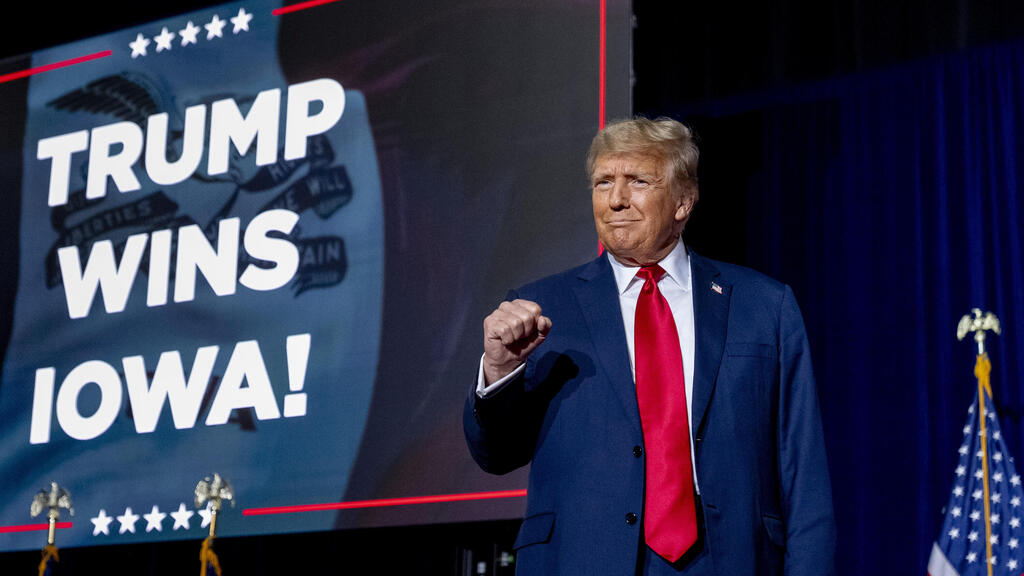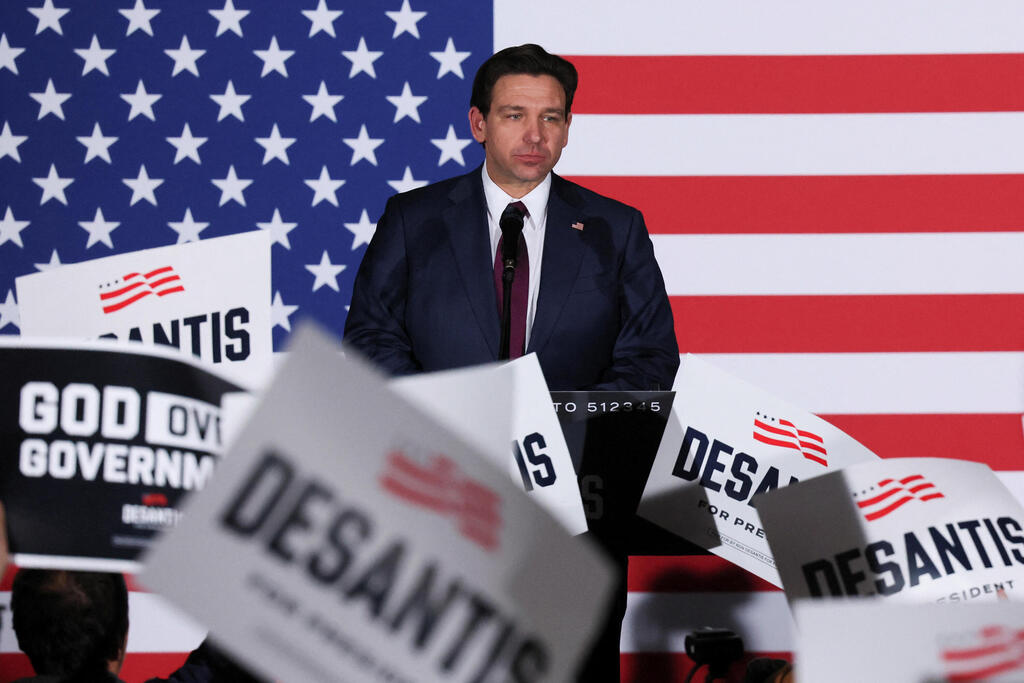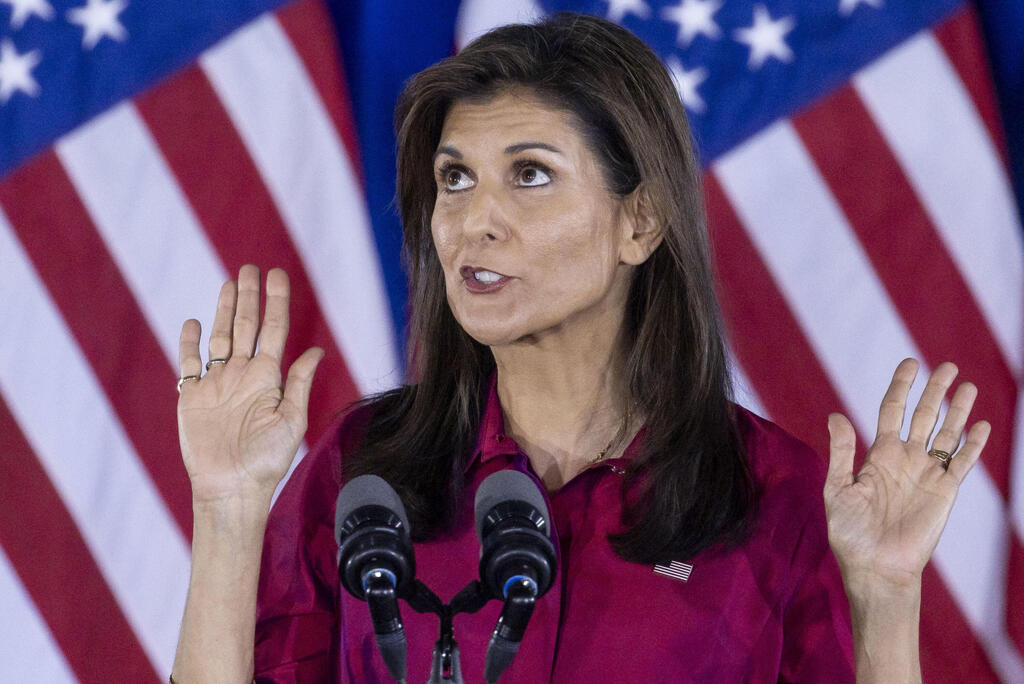Getting your Trinity Audio player ready...
In his Iowa caucuses victory speech, former President and presumptive nominee Donald Trump, said the Hamas October 7 attack wouldn't have happened if he were in office, saying he will fix both the Israel-Hamas conflict and the Russia-Ukraine war once he's reelected.
Read more:
In an interview to Spanish Language Univision channel in November said said the U.S. should take a hands-off approach to the Hamas-Israel war. "You're probably going to have to let this play out," he said.
Trump gives victory speech in Iowa caucus
(Video: Reuters)
Trump has walked away with the Lion's share of delegates, leaving Florida Governor Ron DeSantis in second place and former UN ambassador Nikki Haley in a disappointing third. Indian tech startup mogul Vivek Ramaswamy came in fourth and dropped out of the race, endorsing Trump.
Arkansas Governor Asa Hutchinson came in last, picking up no delegates. His disastrous showing notwithstanding, he has yet to announce his departure from the race.
Potentially on his way to a second successful nomination, Trump could revive two historical events:
1) He could be the first president since Grover Cleveland, to win two nonconsecutive terms at the White House. Cleveland first became Commander in Chief in 1884 but lost reelection to Benjamin Harrison four years later. He then ran for a third time in 1892, winning the presidency a second time.
2) The other is a direct rematch, as a case where the same two nominees run against each other twice in a row, hasn't happened since 1952 and 1956, where in both cases Republican Dwight Eisenhower beat Democrat Adlai Stevenson.
Final results
The state of Iowa hands out 38 delegates during their caucus, proportionately divided between the candidates in accordance to the number of votes they receive. Donald Trump has received 56,260 votes, giving him 51% of the total, which results in 20 delegates. Governor DeSantis has won 23,420 votes, winning him 22.2% of the vote, thereby handing him 8 delegates.
Nikki Haley, who served as Trump's UN ambassador, has come third with 21,085 votes, which means 19.1% of the vote, winning her 7 delegates. Ramaswamy has garnered 8,449 votes, translating to 7.7% of the overall vote, thereby winning him just 3 delegates. Following that disappointing result, the Indian-American entrepreneur has dropped out of the race and announced his endorsement of Donald Trump.
Trump went on his social network, Truth Social, to thank Iowa voters for handing him a victory that is quite remarkable, seeing as the gap between him and DeSantis at 2nd place was over 20%. Up until now, the biggest gap a Republican has been able to win the Iowa caucus, was Bob Dole in 1988, winning by a 12.8% margin.
Gracious in victory but never in defeat, Trump congratulated both Haley and DeSantis, saying they "actually did very well". Additionally, he praised Vivek Ramaswamy for doing "hell of a job".
"They’re very smart people, very capable people," Trump said
Turning his attention to his potential 2024 rival, President Joe Biden, Trump referred to him as "worst president ever", adding "the whole world is laughing at us", citing both Russia’s war with Ukraine and the Israel-Hamas war in Gaza as Biden mishaps. Trump has promised to fix both situations once he’s back in office, though he was short on specifics.
Interestingly, Governor DeSantis came into the race while giving out the impression he would be the one nominee who could potentially take on Trump, but it seems the more voters heard from him, the less they liked him, and now former UN ambassador Nikki Haley, with her rather impressive foreign policy speeches, has commanded a higher lead, and is now in overall 2nd place among Republican nominees nationwide.
While fully aware of Trump‘s commanding lead and all-but-certain renomination, both Haley and DeSantis are staying in the race for two reasons. One is to position themselves as Trump‘s natural successor for the 2028 elections, and the other is to potentially win this nomination by default, should Trump be convicted of a criminal charge and be forced to relinquish the race.
Awaiting multiple trials
Speaking of which, Trump has a myriad of legal woes to face as he prepares for a Joe Biden rematch. The first is the Federal Election Interference Case, in which he is accused of inciting the January 6 riots back in 2021, two weeks prior to Joe Biden taking office. At this point, Trump has been indicted with the trial itself still pending.
The second is the state of Georgia Election Interference Case, where Trump’s efforts to overturn his loss were perhaps the most forceful. There, too, and indictment has been served, but the trial is pending.
The third is the Classified Documents Case were federal prosecutors, led by special council Jack Smith, have accused the former President of taking highly sensitive national security documents when he left the White House in January 2021. In this case as well, an indictment has been served, and Trump is awaiting trial.
Last but not least, is the Hush Money Case, where Trump is accused of falsifying business records in connection to the payoff he made to porn star stormy Daniels, in the amount of $130,000. In late March of last year, a grand jury voted to indict Trump and local prosecutors unveiled the criminal charges. As always, trial is pending.
In spite of all those charges (and some say because of them), Republican primary voters are standing staunchly behind Trump, with 65% of Iowa caucus voters refusing to acknowledge the legitimacy of Joe Biden‘s victory in the 2020 elections, still insisting Trump was "robbed". Of those voters, 63% believe Trump is eligible to serve as president even if convicted on any of the criminal charges he faces.
What's the difference between a primary and a caucus, anyway?
Each of the 50 states, as well as five US territories, will have their own primaries, the last of which will be on June 4. Each state allocates its own number of delegates according to its size. Overall, there are 2,469 delegates to be handed out, with each nominee trying to maximize the number of delegates he collects. The first nominee to clinch 1,235 wins the Republican nomination for President. The official winner will be announced in July during the Republican National Convention, this time to be held in Milwaukee.
Unlike most states, Iowa has no primary, but rather a caucus. A caucus is a run by the state party, while primaries are run by the state itself. Caucus is basically a political meeting, as opposed to a primary, which is an election. In a caucus, a representative from each campaign is allowed to give a short speech in support of his preferred candidate, and then ballots are handed out to the caucus goers, who vote by a secret ballot. Ballots are then tabulated in open view, after which they are recorded on a form by the caucus secretary, and announced by the precinct chair. To close down the proceedings, vote tabulations are electronically submitted to the Iowa Republican party.








